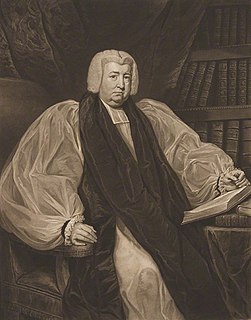Related Research Articles

Richard Neile was an English churchman, bishop successively of six English dioceses, more than any other man, including the Archdiocese of York from 1631 until his death. He was involved in the last burning at the stake for heresy in England, that of the Arian Edward Wightman in 1612.

Edward Rainbowe or Rainbow (1608–1684) was an English academic, Church of England clergyman and a noted preacher. He was Master of Magdalene College, Cambridge, Vice-Chancellor of the University of Cambridge and Bishop of Carlisle.

William Talbot was an English Anglican bishop. He was Bishop of Oxford from 1699 to 1715, Bishop of Salisbury from 1715 to 1722 and Bishop of Durham from 1722 to 1730.
William Wickham (Wykeham) was an English bishop.
William Disney, D.D. (1731–1807) was an English clergyman and academic, and one of the critics of Edward Gibbon.

Thomas Dampier served as Bishop of Rochester and Bishop of Ely.
John Ewer was an English bishop of Llandaff and bishop of Bangor. He is now remembered for an attack on the American colonists, prompted by their indifference to episcopacy.
Francis Hare (1671–1740) was an English churchman and classical scholar, bishop of St Asaph from 1727 and bishop of Chichester from 1731.
John Luxmoore or Luxmore (1766–1830) was an English bishop of three sees.

Nicholas Hardinge (1699–1758) was an English civil servant, clerk to the House of Commons from 1731 to 1752 and then Secretary to the Treasury, and a Member of Parliament known also as a neo-Latin poet.
Richard Arnald was a distinguished English clergyman and biblical scholar.
Peter Peckard was an English Whig, Vice-Chancellor of Cambridge University, Church of England minister and abolitionist. From 1781 he was Master of Magdalene College, Cambridge. He was incorporated at Cambridge in 1782, appointed vice-chancellor in 1784, and created Doctor of Divinity (DD) per literas regias in 1785. In April 1792 he became Dean of Peterborough.
Henry Vincent Bayley (1777–1844) was an English clergyman. Of the High Church party and a reformer, he became Archdeacon of Stow. He associated with the Hackney Phalanx group of High Church activists.
John Burton, D.D. (1696–1771) was an English clergyman and academic, a theological and classical scholar.

Andrew Snape (1675–1742) was an English cleric, academic and headmaster, provost of King's College, Cambridge from 1719.

William Richardson (1698–1775) was an English academic and antiquary, Master of Emmanuel College, Cambridge from 1736.

William Cooke (1711–1797) was an English cleric and academic, Provost of King's College, Cambridge from 1772 and Dean of Ely from 1780.
William Dodwell (1709–1785) was an English cleric known as a theological writer, archdeacon of Berkshire from 1763.
James Calfhill (1530?–1570) was an Anglican priest, academic and controversialist, who died as Archdeacon of Colchester and Bishop-designate of Worcester.
Daniel Bellamy, the younger was an English divine and miscellaneous writer.
References
- ↑ "George, William (GRG715W)". A Cambridge Alumni Database. University of Cambridge.
- 1 2 3 4 5 6 . Dictionary of National Biography . London: Smith, Elder & Co. 1885–1900.
- ↑ Robert L. Mack, Thomas Gray: A Life (2000), pp. 93–4.
- ↑ Jacob, W. M. "George, William". Oxford Dictionary of National Biography (online ed.). Oxford University Press. doi:10.1093/ref:odnb/10545.(Subscription or UK public library membership required.)
- Attribution
![]() This article incorporates text from a publication now in the public domain : "George, William". Dictionary of National Biography . London: Smith, Elder & Co. 1885–1900.
This article incorporates text from a publication now in the public domain : "George, William". Dictionary of National Biography . London: Smith, Elder & Co. 1885–1900.
